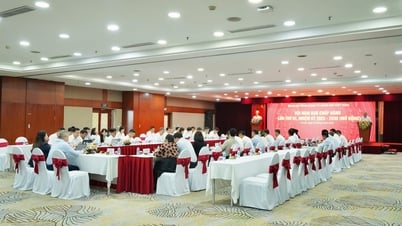Once praised for its skyscraper-studded skyline and smooth operations, Singapore's financial sector is entering a period of strong restructuring. Photo: Singapore landscape. (Photo: THX/TTXVN)
Dual pressures from technology and costs
Once hailed for its skyscraper-studded skyline and smooth operations, Singapore’s financial sector is undergoing a major restructuring. AI has permeated almost every area of operations – from data entry, reporting, customer service to some risk assessments – that were previously handled by humans.
DBS Bank recently announced that it would cut about 4,000 casual positions and replace some routine tasks with AI, a move that reflects a broader industry trend of optimizing costs, improving efficiency and reallocating human resources to higher value-added roles.
In parallel with the technology wave, many international financial institutions in Singapore are promoting the offshoring strategy to India, the Philippines, Vietnam... to take advantage of abundant technical human resources at lower costs. A typical example of this trend is Standard Chartered Bank cutting 80 jobs in Singapore and moving part of its operations to India.
According to HR experts, the impact is concentrated on the group of basic and mid-level job positions - which are easy to standardize and work remotely. The goal of businesses is not only to save costs but also to allocate risks and optimize operations on a global scale.
Government Response: Retraining and Repositioning the Industry
With its experience in macro-management, the Singapore Government is not standing aside. The SkillsFuture program continues to be promoted, encouraging workers to learn throughout their lives and upgrade their skills to meet new requirements. At the same time, the Singapore Government has coordinated with 6 major banks to identify positions affected by AI, implement retraining programs, and support career transitions to protect workers' livelihoods.
However, the structure of Singapore’s financial industry still poses risks due to the high proportion of operations – a group of jobs that are susceptible to automation. The shift to high value-added areas such as fintech, green finance, and asset management requires time, investment capital, and strong adaptation from the workforce.
Lessons from the Hong Kong Special Administrative Region (China)
Compared to Singapore, Hong Kong is less directly affected by AI and offshoring, thanks to its industry structure that favors “front office operations” – which typically refers to customer-facing activities and transactions that take place at the front lines of financial institutions, typically banks, securities firms, or other financial institutions.
Hong Kong's financial industry has long focused on high-end back-office business operations that require complex communication and judgment, requiring complex situational handling skills such as trading, asset management, corporate finance, mergers and acquisitions, and asset management.
These positions often require high levels of expertise, personal networks, market insight, and non-standard decision-making processes, and their level of automation is much lower than that of data processing or back-office functions.
This also explains why Hong Kong has shown greater resilience in this wave of impact. In addition, as a global financial center, Hong Kong's unique geographical location, close ties with mainland China, free capital flows and a strong legal system give it an unrivaled advantage in these high-value-added front-office businesses.
The success of these businesses depends largely on the experience, intuition, and networks of experts, not just on data and algorithms. Therefore, while AI mainly affects routine jobs, the “intelligence” and “network” advantages that Hong Kong’s financial industry relies on make it relatively more resilient to risks in the first wave of impact.
This is not to say that Hong Kong is completely immune to the impact of AI, but the core business nature of this market determines that the direct impact of the AI and offshoring wave on Hong Kong's financial industry is relatively small, and the pressure to transform is more focused on improving efficiency than mass layoffs.
Singapore’s financial sector is at a turning point. The twin pressures of technology and job displacement require a comprehensive repositioning strategy: from upgrading human skills, diversifying business lines to strengthening positions in areas that are difficult to replace with machines.
With its long-term planning and effective execution, Singapore still has the opportunity to turn challenges into advantages. If it succeeds in transforming itself from an “operations center” to a “locomotive” providing smart, high-value financial services, the island nation will not only protect its current position but also consolidate its leading role on the global financial map./.
According to VNA
Source: https://baothanhhoa.vn/trung-tam-tai-chinh-singapore-truoc-nga-re-chien-luoc-258265.htm























![[Photo] Firmly marching under the military flag: Ready for the big festival](https://vphoto.vietnam.vn/thumb/1200x675/vietnam/resource/IMAGE/2025/8/15/86df2fb3199343e0b16b178d53f841ec)

![[Photo] Prime Minister Pham Minh Chinh talks on the phone with Cambodian Prime Minister Hun Manet](https://vphoto.vietnam.vn/thumb/1200x675/vietnam/resource/IMAGE/2025/8/15/72d3838db8154bafabdadc0a5165677f)

![[Photo] Red and yellow stars at the launching ceremony of the program "Moving Forward with Vietnam"](https://vphoto.vietnam.vn/thumb/1200x675/vietnam/resource/IMAGE/2025/8/16/076df6ed0eb345cfa3d1cd1d7591a66f)

![[Photo] Prime Minister Pham Minh Chinh attends a special art program called "Hanoi - From the historic autumn of 1945"](https://vphoto.vietnam.vn/thumb/1200x675/vietnam/resource/IMAGE/2025/8/15/c1c42655275c40d1be461fee0fd132f3)

![[Photo] National Assembly Chairman Tran Thanh Man attends the inauguration ceremony of President Ton Duc Thang Memorial House](https://vphoto.vietnam.vn/thumb/1200x675/vietnam/resource/IMAGE/2025/8/16/23555950872d428a8708a1e2f94cbf59)
![[Photo] The special solidarity relationship between Vietnam and Cuba](https://vphoto.vietnam.vn/thumb/1200x675/vietnam/resource/IMAGE/2025/8/15/5f06c789ab1647c384ccb78b222ad18e)



































































Comment (0)